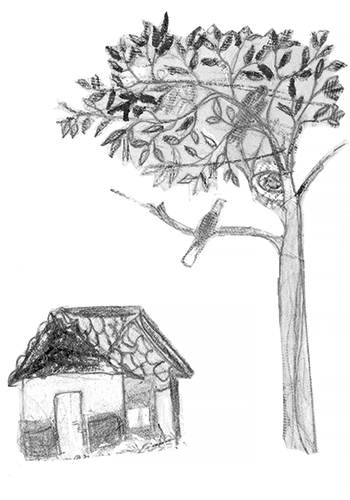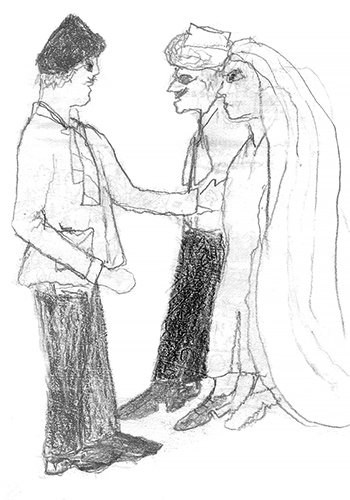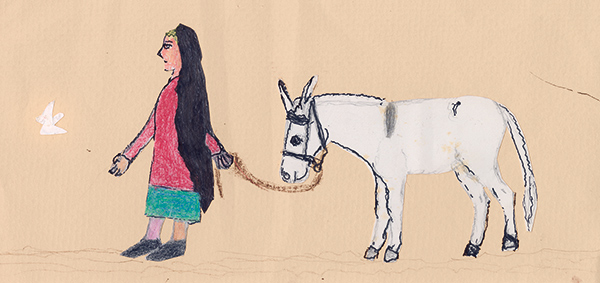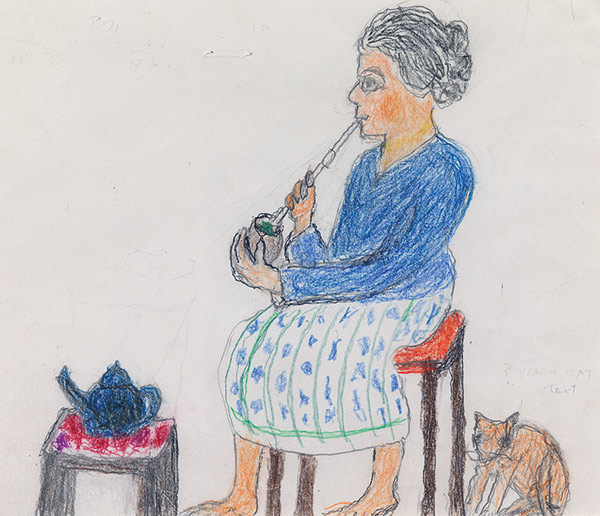Subtotal: $
Checkout-

In Praise of Costly Magnificence
-

The Last of the Cuban Revolutionaries
-

The Religion of Mammon
-

Pay As You Can
-

Ownership and Communion
-

Saving the Commons
-

History Arrives on the Island
-

On Owning Twenty-Two Cars
-

Where Your Treasure Is
-

Poem: “Clair de lune”
-

Poem: “Argument of Periapsis”
-

Poem: “Advent”
-

Editors’ Picks: Thin Places
-

Editors’ Picks: Dinosaurs
-

Editors’ Picks: Natality
-

The Mustard Seed Project
-

Feasting at Teatime
-

Letters from Readers
-

Covering the Cover: Money
-

Hudson Taylor
-

The Effective Samaritan: A Parable
-

The Justice Mothers Are Due
-

The Library at Home
-

Who Deserves Medical Care?
-

A Saver’s Grace
-

Light Came in as a Flood
-

The Other Side of the Needle’s Eye
-

Selling Friends
-

Princess of the Vatican
-

Enchanted Capitalism

Leper Colony Sketches
A woman finds pain and friendship in the enforced community of outcasts at a Paraguayan leper colony.
By Maria Weiss and Maureen Burn
July 15, 2023
Maria Weiss was born in Bavaria in 1900 and moved to South America as a child with her family, growing up on farming properties between Argentina and Paraguay. In 1928, she married Adolfo, the son of neighboring immigrants, and moved to his small farm in Argentina. They had a son, Erwin. After five years they realized that Maria was starting to develop symptoms of leprosy. At the time, lepers were required to live in an isolated colony, and the nearest one was across the border in Sapucay, Paraguay. Adolfo had no choice but to drive Maria there and leave her, returning to their little son, knowing they might never see one another again. Years later, Maria recounted her experiences to a friend, Maureen Burn, who recorded and translated them from Spanish.
A long time passed in which my only wish was to die and forget my misery. I had lost faith in everything. I believed neither in God nor the devil, and I never thought of the Bible anymore. I thought, what good had it been? It hadn’t saved me from all this. I had quite forgotten how to smile and was more like a log than a living person.
Anastasia was very kind to me. She brought me my food and never pressed me to do any work in return for it. She said I could help her with the work if I wished, but I didn’t wish to do anything. I just sat there pining for my husband and child. I must have continued like this for a couple of years.
Then one day when I was sitting out in the shade of a tree, a stranger came up to me and shook my hand and said, “How are you, Doña Maria?”
I wondered how he knew my name, so I looked at his face and recognized the keen young evangelist who had first told me about the Bible years before. His eyes were the same, though he was no longer so young.

All illustrations by Maria Weiss.
I said, “I am very unhappy.”
He said, “Seek for Jesus Christ,” and he left me without another word.
I thought, “What a strange thing to say, and not a word of sympathy!” I went indoors and rooted out my Bible from the bottom of my trunk. I opened it and tried to read it but could not make head or tail of it. When Eugenio saw me with it, he said, “There is a group that reads the Bible every Sunday morning. They are Protestants of all kinds, and anyone can go and ask them to explain it.”
So I went. The group met at the hut of a man called Apolinario. He welcomed me and told me I could come any time, and he gave me the present of a bombilla. He said I should learn to take maté with it. It was a good pastime, it was wholesome, and it would mix well with my thoughts about my husband and my son, and God.
[A bombilla is a metal straw with a built-in sieve. Yerba maté is a caffeinated drink brewed from dried leaves of a South American holly species.]
I found that to be true, and I began to go every Sunday to the gathering, and I began to understand bits of the Bible, the way Apolinario explained it. And then I began slowly to come alive again. I stopped sitting about, and I began to help Anastasia with her work.
I did not learn all this at once, but bit by bit, as I began to forget my own sorrows and look around me. I went regularly to the gathering on Sunday morning, and I felt something strong and helpful in Apolinario. He was happy and had a trust in God, in spite of his very advanced state of the disease. This interested me so I asked him to tell me the story of his life.
Apolinario had been a soldier in the Chaco War (1932–1935). He was a devout Roman Catholic and practiced his religion conscientiously. He had seriously studied the Roman Catholic catechism, but he found something lacking. The thing he was looking for was a direct way to God without any priest or other man being necessary as a go-between. He was badly wounded and spent many months in hospital in Asunción. A Salvation Army woman used to come round the ward, visiting the patients and giving out Bibles to any who were interested. He took one and read it with deepening interest, for he thought it certainly spoke of a direct way to God, with Jesus the only mediator to show the way. He put a lot of questions to the woman, and she said they believed the way he did.

So Apolinario decided he wanted to put his life straight with God and with man. This caused him a bitter and painful struggle, which tore him for weeks, for he knew what the consequences would be if he confessed what he had been hiding. So he confessed that he had leprosy. He also felt he should marry his compañera, who was mother of his three children, even though he now had to leave and go to the newly opened leper colony at Sapucay.
Ever since then, Apolinario had been trying to pass on to others what he had found. He held a little group of Protestants together and helped many to find a new strength and overcoming of their sorrow through faith. This often meant teaching people to read, so that they could read the Bible. But he would always tell them, “A man can only teach another a little bit about the Bible. The true teacher is the Spirit of God in the believer’s heart. He will show you the meaning more and more, as you trust Him more and more in your life. Then you will find the Bible is an endless treasure house – you will always get something new out of it that you did not see before. It will become a lamp to your feet.”
After the meeting on Sunday morning at Apolinario’s hut, we used to have some fine talks. Apolinario was especially glad to welcome unbelievers. They often said they found no attraction in religion, as religious folk were often so sour-faced. “Oh,” said Apolinario, “that is unfortunately true, but such people are not yet free of the hold of the devil.” Some people were surprised when they heard this, but Apolinario continued, “Very few people realize that it is the good folk who are the devil’s working-ground. He is kept busy working on them. He does not need to bother about folk who just live for their lusts. He has them already in his kingdom, and he can leave them in peace, as they don’t know he exists. But as soon as man begins to think, ‘Perhaps there is a God,’ then he begins to know there is a devil also. The man may think he is out of the devil’s power, because he has stopped sinning, but as soon as he goes about in fear of the power of evil, he is still lassoed. Some good people are always on the lookout for evil and see evil possibilities in everything, so they frighten away the young with their sour looks. If only they knew how dangerous it is to think of the devil without each time thinking of God, to let your mind so dwell on evil that you forget that God is the stronger! The only way to cut free from the devil’s lasso is to cut the bonds of fear, in faith in Christ’s victory.”
I heard of a house that was cheap, as it was in such bad repair. I got a letter writer to write and ask my husband if he could help me buy it, which he did. The disadvantage of this house was that it was near the edge of the colony, so I found I was robbed of anything I left lying about outside. I lost my cooking pot, and I even lost my big feather eiderdown, which I had brought with me from home. I had hung it on my line to air in the sunshine.

But one good thing was that I was near a wood and could collect a nice big pile of firewood. I used to take my axe and go out for the day or just for the morning. But one day I was so pleased with myself for chopping such a nice pile of wood that I forgot to bring my axe home with me. That was a big loss; I asked a man living nearby if he had seen it. He said, “What will you give me if I find it for you?”
Often you heard people say, “Nadie hace ni un pelo sin dinero.” (No one will do the least bit without pay.) This was said about the rich as well as about the poor. I was once collecting sow thistle outside the patio of a very fine house. The owner came out and said, “How much will you pay me for that?” But I went off and left her with her sow thistle weeds, which she could not use herself, as she had no pig.
One day in the meat queue the folk were laughing about Don Federico’s latest joke. Don Federico was very learned. He had lots of newspapers sent to him, because he wanted to know all that was happening in the world. For the past months his whole talk had been about the atom bomb, which he said was a terrible and crazy thing. He said that if an atom bomb were to fall on the colony, it would be a blessing – everyone would be cured in a flash!
Candido, a student, was standing next to me in the queue. He sometimes came to Apolinario’s hut. I turned to him and said, “I am a tonta (stupid person). I can’t figure out what an atom bomb is like.” “You don’t need to figure it out,” he said. “It is just what happens when you have bigger and better wars. But the root of all wars is the same – greed and envy.”

Adolfo and Maria’s wedding.
I thought about that. I didn’t know anything about war, but I knew plenty about greed and envy, not only in rich people, but also in very poor people.
The man from whom I had bought my house had been a poor man and unable to do any repairs. I could understand that, but I could not understand why he had slashed and cut anything he could not uproot and take with him. He had even cut down two lovely creepers by the patio, because they would not transplant. They were lying on the ground withered. One was a beautiful mauve passionflower in bloom, and the other was Sábado tarde (Saturday afternoon), which has a beautiful scent and is used instead of perfume, though the flowers are greenish and not beautiful.
However, the creepers both began to grow again and made a nice bit of shade for my patio, and such a beautiful scent from the Sábado tarde! So I was very glad.
Another time I saw a man move to another house in the colony, and he went round squashing all his ripening pumpkins. I could not understand, so I asked him why he was wasting them like that.

“Oh,” he said, “they won’t ripen if I pick them and take them with me; they’re too green yet.”
“But why don’t you leave them for the next man who will be living there?”
“I don’t want another man to gain by my labors,” he said. “I planted them. I looked after and watered them.”
“Well,” I said, “what about all the hungry pigs that wander around looking for something to eat? Couldn’t you have left the pumpkins for them?”
“I don’t want another man’s pigs to fatten on my labor,” he said. So we said no more about it.
That spirit is the root of war. It is very strong, but God is stronger.
[Some years later, Maria was recovering in the women’s hospital wing after an illness.]
I had asked my neighbor, Mauricio, what would be a fair price for my calf that day when I went to visit my animals. He said, “Seven hundred guaranís.” Mauricio was the young man who could not be false or hypocritical, and I trusted him completely.
I told the women in the hospital that evening that I hoped to sell my calf for seven hundred guaranís. The news must have spread fast, for the very next morning Braulia came running to the hospital from her house at the far side of the colony. She came to ask if I would let her have the calf for one hundred guaranís down and the rest in slow stages later. I knew Braulia well, because I had lived with her and her brother Julio and their mother Felipa when they were children and when I had no home of my own.
Now Braulia was married and very badly off. Her husband was a guitarist, and he found it hard to earn a living now that gramophones were taking the place of harps and guitars in the colony. I also had noticed that wives of musicians had all the heavy and rough outdoor work to do, for their husbands had to keep their hands soft and smooth. I felt sorry for Braulia and let her have the calf for one hundred guaranís down and the rest later.
The women in the hospital had been listening to our conversation, and when Braulia had gone, they came up to me and said, “You’ve made a bad bargain there” or “You’ll never see the rest of the money” or “Don’t you know that pair are a couple of thieves?” But they were wrong, for Braulia paid me the full sum in time.

These comments of the women in the hospital did not upset me in the least, but I had two visitors at the time: Catalina, who had come with some copies of Arco Iris for me, and Eminencia, who asked if she could live with me for a bit. Catalina said, “You’d better let me keep the hundred guaranís for you, or you will give them away,” and Eminencia added, “Or you will lose them.”
I was quite offended and said, “No, I can keep them safely myself.” So they went, and I tied the money in the corner of a white head kerchief that I had. Then I went home to get a second bed put up for Eminencia. The next day was Sunday, and Florenciana came to see if I was well enough to go to the meeting with her. She said, “Hurry, or we’ll be late.” It was a hot day, so I put on my kerchief to protect my head and neck. I walked so fast that I got too hot and pushed the kerchief back off my head and forgot about it. After the meeting, when it was time to go back to the hospital, I noticed it was missing, with the money still tied in one corner! I looked everywhere in and around my hut and asked at all the houses on the way back to the hospital if anyone had seen it, and they all said no.
When I got back, already a few people were waiting for me. News had got around that I had some money, and one after another, people came to borrow some.
I told them I had none. “But you got a hundred guaranís yesterday,” they said. “Yes,” I said, “but I’ve spent it.” Then I realized I had lied. It had all happened so quickly, and I had not meant to lie. And I thought how cunning the devil was to make me do it, when I wanted to live telling the truth.
Then I saw in a flash how he had managed it. He made me proud. I did not want the women to laugh at me and say, “There now, we told you so!” So I lied. And I remembered that the devil himself had fallen by pride, so he knows very well how to use pride to make others stumble and fall. I felt cast down about myself, but I knew I could forget myself and my failings by getting a fresh look at our Lord. This I found to be true, and I was also set free from my self-despondency, so as to think of others who might need a helping hand.
When I came back to my hut, I made myself a maté and sat in the shade of the creeper by my door and sucked the bombilla Apolinario had given me so many years ago, when I first went to his gatherings. He had told me the bombilla would be a good pastime and would mix well with my thoughts.
In my more active days I did not linger for hours with my maté bombilla, but I always liked maté. I found it warmed you when you were cold and cooled you when you were hot, and it gave you fresh energy when you were tired.
And I found now that it was truer than ever that the bombilla mixed well with my thoughts. But I found my thoughts had completely changed since those early days in the colony. Then my thoughts were entirely about me or about mine. I was sorry for myself, and it was always a case of “poor me,” and I worried endlessly about my husband and my son.

Now I hardly ever thought about myself. I often used to think I had little more education than one of my hens, but I knew that just as God had cared for me all these years, so he could care for my husband and child also. So I did not worry anymore but trusted them to his hands, for I knew he could care for them better than I could.
And I began to realize how many things I would not have known if I had stayed happily at home, with husband, son, house, and farm, and kith and kin nearby. For at the colony I was forced to find strength and comfort in the Bible and the hymnal.
I had also learned that God can come and give a joy such as I had never heard of when I had all the things around me that folk prize most in life – husband, child, and home.
After eighteen years, Maria was reunited with her husband and son, who had meanwhile joined the Bruderhof’s Primavera community about one hundred miles north of Sapucay.
Immigrants who were expelled from Germany in the early years of Hitler’s regime, Bruderhof members had built up three communities in eastern Paraguay, which were in existence from 1941 to 1961. They also ran a hospital for the surrounding area; it was here that Maria was flown in a small plane in 1954, for an operation. She was welcomed to stay, living in semi-isolation by the hospital until it was clear that her leprosy was in abeyance, and then joining the life and daily activities of the community together with her husband and son, to their great joy. Maria died in a Bruderhof community in Connecticut in 1988.
Already a subscriber? Sign in
Try 3 months of unlimited access. Start your FREE TRIAL today. Cancel anytime.










































